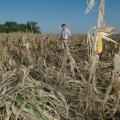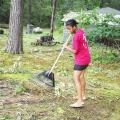News From 2005
By Norman Winter
MSU Horticulturist
Central Mississippi Research & Extension Center
After Hurricane Katrina, words like "uprooted," "transplanted" and "salvaged" are applied to many devastated lives, homes and communities. They also may be applied to the landscapes where homes once stood and where fallen trees now lie.
By Norman Winter
MSU Horticulturist
Central Mississippi Research & Extension Center
Mississippi's second planting season is here, bringing many choices to liven up tired landscapes. There are mums and marigolds, salvias of all sorts, late season zinnias and one of my favorites, the ornamental pepper.
Ornamental peppers have changed dramatically over the last few years to become real landscape assets. We now have choices like the colorful, Medusa, Chilly Chili, Masquerade and a new one called Black Pearl that will steal your heart for sure.
MISSISSIPPI STATE -- Hurricane Katrina claimed many homes on the Gulf Coast, taking with her valuable financial and personal documents that families will want to replace.
Bobbie Shaffett, Mississippi State University Extension Service family resource management specialist, said knowing where to look for help can make this job easier and quicker.
MISSISSIPPI STATE -- Families may have survived one life-altering storm only to face more destructive forces from within.
Marilyn Bailey, leadership development area agent with the Mississippi State University Extension Service, knows firsthand about the stresses created in the wake of Hurricane Katrina. Her home in Bay St. Louis is gone, and her office with the Hancock County Extension Service was bulldozed without workers being allowed to examine the debris for materials to salvage.
MISSISSIPPI STATE -- Hurricane Katrina gave thousands of school children a vacation no one wanted, and the break from schoolwork in Mississippi is expected to last as long as seven weeks.
Some students transferred to other schools, and many already have resumed classes in their own school. Others in shelters and scattered throughout damaged communities are still not back in school.
MISSISSIPPI STATE -- Thousands of miles and millions of dollars worth of fences in south Mississippi were destroyed by Hurricane Katrina, leaving producers with overwhelming odds if they continue in the cattle business.
Mike Keene, area livestock and forages agent for Mississippi State University's Extension Service, is based in Hattiesburg. He said help is arriving in the form of fencing supplies and feed, but challenges abound for farmers.
MISSISSIPPI STATE -- Animals from family pets to commercial livestock herds and poultry flocks are important parts of life in the storm-ravaged areas of Mississippi.
A toll-free number has been set up by the Mississippi Board of Animal Health and staffed by Mississippi State University's College of Veterinary Medicine for calls about all animal-related issues. The number is (888) 722-3106.
MISSISSIPPI STATE -- Simple computers with Internet access are easing part of the emotional burden of evacuees desperate to reconnect with family.
When Hurricane Katrina hit the state with its high winds and devastating water, much of the communication infrastructure in the lower one-third of the state was lost in a few hours. Hundreds of lives were also lost in that brief span.
MISSISSIPPI STATE -- Hurricane Katrina closed the three ports serving Mississippi agricultural commodities, so products leaving the state face new challenges and increased costs.
The Port of Gulfport was wiped clean of its infrastructure, the Port of Pascagoula was damaged, and the Port of New Orleans, while not substantially damaged, has little infrastructure and few employees left to support it. All three served Mississippi producers.
MISSISSIPPI STATE -- Without electricity to produce milk, Mississippi dairy farmers and processors suffered significant, direct economic losses from the ravages of Hurricane Katrina that average an estimated $35,000 per farm.
Hurricane Katrina tracked through the middle of Walthall, Marion and Lincoln counties, the state's highest populated dairy counties. About 75 percent of the state's 230 dairy farms are located south of Interstate 20, and more than 50 percent of these farms are concentrated in the hard-hit counties near McComb and Brookhaven.
When disaster strikes, the little things take on more importance. Saving something from a site of total devastation can be a big boost, even if what is saved is just a tree or a special bush. As I travel around in the aftermath of Hurricane Katrina, I have noticed a few things that could be overlooked by homeowners.
Water is critical...
MISSISSIPPI STATE -- Residents across Katrina-damaged areas are being discouraged from burning debris left in the hurricane's path.
Glenn Hughes, a forestry professor with Mississippi State University's Extension Service and a resident of Hattiesburg, said Mississippi residents should delay brush fires until conditions improve in the disaster area.
MISSISSIPPI STATE -- Thousands of buildings across the Gulf Coast may have survived the winds of Katrina only to fall victim to health-threatening mold spores.
"Mold and mildew are always challenges in Mississippi because they thrive in warm, humid, and damp or water-damaged conditions," said Herb Willcutt, safety specialist with the Mississippi State University Extension Service. "The storm surge and heavy rains brought in by Katrina are likely to contribute to an explosion of mold spores in these areas."
MISSISSIPPI STATE -- Transporting gasoline to Hurricane Katrina victims may seem helpful, but the task actually is extremely dangerous.
Ted Gordon, a Mississippi State University Extension Service safety specialist at the North Mississippi Research and Extension Center in Verona, urged people to keep safety in mind when filling containers with gasoline.
MISSISSIPPI STATE -- Mississippi's agricultural industry may have survived the initial impact of Hurricane Katrina only to become the victim of exorbitant fuel prices if farmers can find supplies at all.
Reports from each of Mississippi's agricultural commodities seem to have the same primary concern: fuel. The state's crops facing major challenges related to the fuel situation include poultry, timber, cotton, soybeans, catfish, dairy, peanuts and horticultural crops.
By Norman Winter
MSU Horticulturist
Central Mississippi Research & Extension Center
Knowing you live in an area at risk for hurricane damage is one thing, but watching a Catagory 4 or 5 hurricane barrel down on your home is a helpless feeling. When the time for recovery arrives, cleaning up landscapes can seem overwhelming, especially if a lot of trees are down. What took a few hours to bring down, may take weeks to clean up.
MISSISSIPPI STATE -- Use caution while operating generators in the wake of Hurricane Katrina to avoid further damage to homes and health.
Herb Willcutt, safety specialist with the Mississippi State University Extension Service, said generators can be an invaluable resource after a disaster, but improper use can be deadly.
MISSISSIPPI STATE -- Hurricane damage threatens two things necessary for human and animal survival: water and food. In the wake of Hurricane Katrina's flood waters, people are discovering how precious clean drinking water can be.
Jimmy Bonner, water quality specialist with Mississippi State University's Extension Service, said boil-water notices have been prevalent across the state and consumers should follow that advice.
MISSISSIPPI STATE -- Getting a settlement from an insurance company in the wake of Hurricane Katrina, expected to be the most costly disaster in U.S. history, is a necessary early step in rebuilding lives.
Mississippi State University experts are urging those with claims to make safety and documentation top priorities when returning home and cleaning up after the disaster.
MISSISSIPPI STATE -- When a disaster such as Hurricane Katrina strikes the state, officials add price gouging and illegitimate charities to the list of things they must deal with.
Bobbie Shaffett, associate professor of human sciences with Mississippi State University's Extension Service, said Mississippians are a generous people, but there are always a few people who see a disaster as an opportunity to scam others.
Pages
News Types
- Crop Report (428)
- Feature Story (5905)
- Feature Photo (53)
- Extension Outdoors (319)
- Southern Gardening (1480)
- Extension Inbox (95)
Archive
- 2025 (96)
- 2024 (186)
- 2023 (182)
- 2022 (183)
- 2021 (176)
- 2020 (211)
- 2019 (222)
- 2018 (276)
- 2017 (336)
- 2016 (381)
- 2015 (456)
- 2014 (495)
- 2013 (487)
- 2012 (491)
- 2011 (354)
- 2010 (320)
- 2009 (313)
- 2008 (272)
- 2007 (263)
- 2006 (252)
- 2005 (278)
- 2004 (270)
- 2003 (279)
- 2002 (227)
- 2001 (238)
- 2000 (241)
- 1999 (231)
- 1998 (231)
- 1997 (239)
- 1996 (58)
- 1995 (36)





